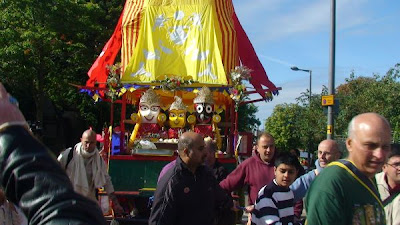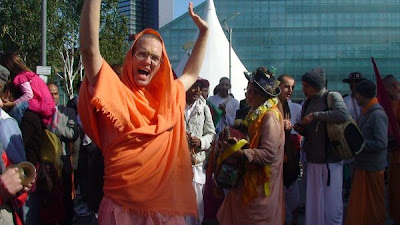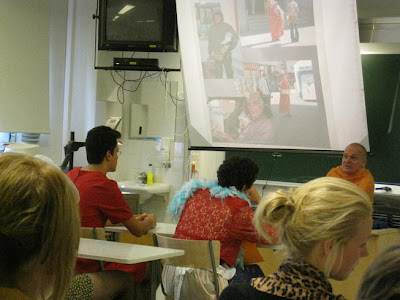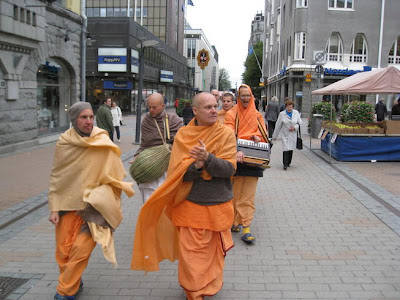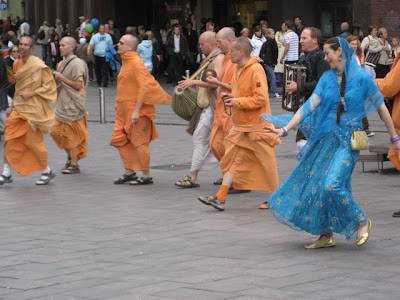Diary of a Traveling Sadhaka, Vol. 4, No. 19
By Krishna-kripa das
(October 2008, part one)
Alachua and Gainesville, Florida, and Albany, New York
(Sent from Gainesville, Flordia, U.S.A. on 10/25/08)
Where I Am and What I Am Doing
Visiting Alachua temple. Chanting at the campus in Gainesville. Visiting my family in Albany. (Not necessarily in that order.)
Devotional Meditations
From a Srila Prabhupada lecture: "Unless you become first-class devotee there is no chance of being relieved of this material existence.""Every family in every society can conduct sankirtana-yajna at least every evening. In this way there will be no disturbance or scarcity of rain. It is essential for the people in this age to perform the sankirtana-yajna in order to be materially happy and to advance spiritually" (SB 5.4.3).
Notes from a darshan with Hridayananda Dasa Goswami SB 5.9.13-14:
- Srila Prabhupada mentions in the purport that human sacrifice is done by barbaric, low class people. Everything in the scripture is not necessarily "Vedic". The Srimad-Bhagavatam was just describing human nature as it is, and the Vedic culture was just trying to deal with realities of human nature. Whenever you get a sufficently varigated gene pool, you are bound to get some people who are into human sacrifices.
- The idea of kings hunting is not necessarily "Vedic". To get someone passionate enough to be king, they are bound to have some bad qualities. The allowance for ksatriyas to hunt is not there by intent but by necessity because they will do it anyway.
- Satsvarupa Dasa Goswami asked Srila Prabhupada how do fire sacrifices. Srila Prabhupada said, "Shortcut."
- For people’s psychological needs they want a guru is a superman or celebrity. Someone purely representing the sastra alone is does not satisfy them.
- To really be a second class devotee is not easy. Can you have an international society where most of the devotees are absorbed in missionary work? In the beginning we were all youthful with recent conversion experiences so enthusiasm for preaching was natural. But can that be maintained in an institution?
- In Jada-yoga, you put yourself in the lowest possible state, by accepting various dualities, and thus become free from false ego. It works but it is not for this age.
- We have technology far beyond what we had in the 1970s but in many ways we have less communication.
- I am trying to figure out what I can do with my psychophysical nature to benefit the greatest number of people for Srila Prabhupada, and have a transforming effect on Srila Prabhupada’s movement.
Notes from class by Kripa Sindhu Prabhu:
ISKCON history: In the early days, after the morning program, they had another class, and then went on harinama for three hours, took lunch, and then went out on harinama for three more hours, and then took a shower and went to the evening program. Srila Prabhupada said if we don’t go to the evening program, we would all fall down. Every one was fully engaged and it was pretty fired up because of that. We would tell the people to surrender to Krishna now, and many did.
In Brihad Bhagavatamrita, Gopa Kumar did not know if he was in Goloka, the spiritual abode, or Gokula, its replica in this world, because the same activities are going on in both.
We can understand from the scripture, we have already been through the different bodies and had the different experiences.
Acaryas compare the desire for fame to be in the same category as having sex with a low-class prostitute.
We should follow Srila Prabhupada’s program because we are not perfect pure and are subjected to the four defects of the conditioned soul. [We cannot devise a better path.]
In the questions and answers after class, one devotee lady told of an impromptu Sunday feast program at a friendly Indian’s house where she and a friend followed Srila Prabhupada whole program with kirtana, lecture, and prasadam and how it was amazingly successful. There was no prasadam left for them at the end, but they were so happy from sharing Krishna consciousness with others, they didn’t mind.
Notes from a class by Dravida Prabhu on Caitanya-caritamrita Adi 17.50-51:
We should not blame anyone else for our suffering, especially God. We must understand that the suffering we encounter is Krishna’s personal program for our purification from the tendency for sense gratification, and is thus benedictory. Practically every great devotee encountered some misery in the course of his life. Because the devotees are eager to go back to Godhead, they want to receive all the reactions that they are due before the end of life, and so are not disturbed by the miseries, but are grateful for them.
Kaviraja Goswami spoke very wonderfully and his words did not offend even those he rebuked during chastisement. Raghunatha Dasa Goswami established the superiority of the service of Srimati Radharani. Raghunatha Bhatta Goswami considered that all Vaishnavas are sincerely serving the Lord according to their realizations and should not be criticized.
Notes from a class in Gainesville by Dravida Prabhu:
The modern tendency is to depersonalize everything including our own consciousness, but the Vaisnava principle is to see the personality of Godhead everywhere and in everything.
The names that describe Krishna’s forms and pastimes are His primary names.
One of the reasons the Hare Krishna mantra is called the maha-mantra is that it not only offers obeisances to and glorifies the Lord, but directly calls out and implores the Lord to be engaged in His service.
Notes from a class by Laskmi Nrsimha Prabhu:
The Christians have the idea that Jesus and the Father are one. We can understand how that can be true because we understand the principle of the satyavesa-avatara, in which a living entity is empowered as an incarnation of Godhead with special powers.
All the ‘rights’ movements reveal intense identification with the body.
Campus Bhajanas Awaken Devotion in Students
Brian from Santa Fe Community College and Celia from University of Florida both excitedly told me how they became attracted to Krishna consciousness from the campus bhajana programs at their respective colleges. Celia said that the chanting attracts you on a deeper level than you can realize. Both now attend the daily chanting on the University of Florida campus and talked to me during an evening program at our Gainesville Krishna House. I felt so inspired to hear how the chanting attracted them since the public chanting is an important part of my life. I suggested that Celia might try coming to the morning program, which Brian is already doing, and she expressed some interest in that. The next day both of them helped carry the instruments back to our Krishna center after the campus bhajanas. The following day they came to our gourmet dinner program, and after it was over, asked the devotees if we could have a kirtana. The other devotees were tired from cooking and serving out and still needed to clean up, but I, who was also feeling a void without an evening kirtana, chanted with them for fifteen minutes. My friends from Europe speak disparagingly from what they have heard about our outreach programs in America, but I can see, as American book distributors tell me, the field in America is as good as it ever has been, if not better. When we are out in public to share Krishna with others, people there become attracted. The problem is that there are only a too few fulltime or even parttime missionary devotees in America. Otherwise it is a great place to share Krishna
consciousness with others.
You Should Choose a Religion!
My sister, Karen, that her daughter, Fern, told her how her grandmother wanted her to choose a religion. To hear that was humorous for me because I had been considering advising her in the same way. Now she is sixteen. Her mom is a Buddhist, her grandmother, Quaker, and me, her uncle, am a Hare Krishna. She comes to all the different services from time to time, but doesn’t really practice any of them on her own. She is a lifetime vegetarian, however. Karen thinks that as she has taken her studies seriously like adults around her did, she will some day take up a religious practice on her own, like those around her. The Vedic idea is that children should be reminded that this human form of life is simply meant for spiritual life and be encouraged to endeavor in that way. My father and my mother were not so attached to the Anglican and Catholic religions of their births, so when Karen and I were young they looked for a path they both had faith in so we would have some idea of spirituality. Thus they joined the Quaker meeting in Albany. That consideration by the parents to promote spirituality in their children is actually the parents’ dharma. We will see what happens with Fern. I told Fern I was thinking the same thing as her grandmother (my mother), but I did not push her to choose a religion. I am so averse to people trying to push me to make decisions, I cannot do the same to others. I did, however, make the point to her that at least when she goes to the Hare Krishna services, she can count on there being vegetarian food. With the others, you never know. Even the Buddhists sometimes have preparations containing meat at their programs.
Quaker Meeting
The Sunday I was home in Albany I went to the Quaker meeting I attended as a youth. The Quakers teach complete pacifism, equality to all human beings, andthat God is in everyone’s heart. They also highly value the search for spiritual truth. In the unprogrammed meetings as we have in Albany, they sit in silence for an hour, presumably thinking of godly things, and anyone can stand up and speak briefly, if inspired, during that time. After their meetings, they serve refreshments. I was late half an hour because I miscalculated the baking time for some prasadam cookies I made to add to the refreshments. No one spoke for the first twenty minutes I was there. I decide to quote a very ecumenical verse from the Vedic literature: smartavyah satatam vishnur, vismartavyo na jatucit, sarve vidhi-nishedhah syur, etayor eva kinkarah. "One should always remember the Supreme Lord. One should not forget Him at any time. All the other scriptural injunctions and prohibitions are servants of these two principles." I spoke briefly saying that whatever our religion is, we may sometimes get caught up in the rules and rituals and forget that the important thing is to remember God. After that in the five remaining minutes at least a couple people spoke, each talking about how they saw God in their life recently in some way or other. One saw Him in the colorful autumn leaves and another in the loving responses of friends during his illness. I felt victorious because we as devotees promote the glorification of God, and so that a couple people broke the silence, and spoke in God’s favor made me smile. One elderly lady told me afterwards that now she is almost completely vegetarian now, and I encouraged her. A sociology major from Skidmore told me she liked my quote, and I sent it to her by email. Many liked the cookies. One later mentioned them in an email to my mother. I noticed the Sunday school kids playing outside and took a few cookies to them. They had studied that day the Biblical story of Jonah and the whale, and I asked them to tell it, as I did not know it. Apparently God wanted Jonah to preach, but he did not want to, and went sailing instead. He got in an accident and ended up being swallowed by whale. He realized that he made a mistake, and prayed to God who arranged his rescue. Then he went to preach to the people God had ordered him to. It reminded me of the fact that Lord Caitanya has ordered us all to preach. Perhaps if we do not do so, we will get into a jam like Jonah. Better not chance it.
ataeva ami ajna dilun sabakare
yahan tahan prema-phala deha’ yare tare
[Lord Caitanya continued,]
"Therefore I order every man within this universe to accept this
Krishna consciousness movement and distribute it everywhere"
(Cc. Adi 9.36).

